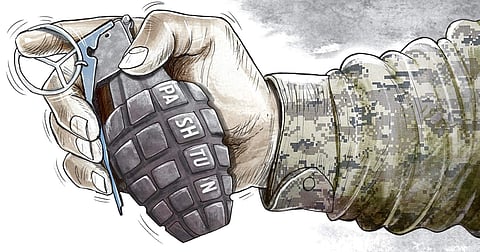Pashtun dissidents in Pakistan
It was, seemingly, nothing more than a routine phone chat between two leaders of neighbouring countries greeting each other on the commencement of the Holy month of Ramadan—a month-long period of piety and fasting for Muslims.
However, the May 5 phone chat between Pakistan’s PM Imran Khan and Afghanistan’s President Ashraf Ghani was given star billing in the Pakistani media for its content, especially for what Imran said to Ghani, articulating, ad nauseam, his favourite theme of the need for both countries to join hands in defeating the monster of terror long threatening their ties.
Imran also renewed his invitation to Ghani to visit Pakistan for substantive talks on their relations—an invitation which Ghani has been stalling and dragging his feet for sometime.
Ghani has been biding his time on honouring Imran’s invitation largely because of Afghan reservations on two issues, both of which Pakistan insists are of domestic provenance and priority to it and Afghanistan has no locus standi on them.
One is the construction by Pakistan of a border fence—not a wall—all along the nearly 1400 km long boundary with Afghanistan. The Pakistani defence establishment regards the fence as an essential asset to thwart the influx of terrorists from the Afghan side.
Only a couple of days before Imran’s chat with Ghani, Pakistan’s defence spokesmen had proudly claimed that the fencing work along the border was nearly completed, with only a few dozen monitoring towers yet to be finished.
The second is the issue of a youth movement in the Khyber Pakhtunkhwa (KPK) province of Pakistan sharing not only a historical border with Afghanistan but also ethnic and linguistic camaraderie going back to millennia.
What has for some time been hogging attention and opinion of social media activists in Pakistan, more than conventional press or media, is a movement of Pashtun youths known as PTM (Pashtun Tahafuz, or Protection, Movement) and led by a firebrand 26-year- old Pashtun going by the name of Manzoor Pashteen.
PTM came to prominence, and into the media limelight, in early 2018 after an aspiring young Pashtun male model in Karachi was killed in a contrived encounter with Sindh Police. PTM blamed the notorious ‘deep state’, the popular euphemism in Pakistan for the omnipotent military establishment for that cold-blooded murder.
However, the charge against the ‘deep state’ was based on thin ice. Overwhelming evidence in that murder was against a notorious senior cop, Rao Anwar, who happened to be a trusted crony of Asif Zardari. All available evidence pointed the finger at Zardari for that extra-judicial killing because the aspiring model was a close friend of Zardari’s son, Bilawal, Chairman of PPP ruling over Sindh. Rao Anwar is still being prosecuted for his alleged crime.
However, such is the popular, but suppressed, sentiment against the involvement of the powerful military establishment in the governance of Pakistan—especially among its intelligentsia—that PTM’s tirade against the ‘deep state’ found receptive ears across the spectrum of a socialist media that deems it its bounden duty to educate the people against the deep state’s shenanigans.
PTM has since been a thorn in the military’s side. The generals haven’t quite been helpful to themselves by being openly hostile to PTM, charging it with impunity for its alleged anti-state activities.
The most toxic of the military establishment’s accusation against PTM is that it’s in the service of foreign intelligence agencies inimical to the national interests of Pakistan. On April 29, less than a week before Imran’s chat with Ghani, the military’s principal spokesman, ISPR’s (Inter-Services Public Relations Directorate) General Asif Ghafoor held a long press conference and harangued against what he alleged were PTM’s anti-state activities. He cited dates and venues where PTM’s activists had met with agents of India’s R&AW and Afghanistan’s NDS (National Directorate of Security). Pouring scorn on their anti-Pakistan activities, the general dared PTM’s henchmen to justify receiving funds from NDS and R&AW.
The military establishment’s public bickering with the likes of PTM, a movement of Pashtun youths, poses a serious dilemma to Imran’s leadership. KPK, which PTM boasts as its cradle, has been ruled by Imran’s political party, PTI, since 2013. Imran’s populist support has its roots among the country’s youths who have long held its dynastic and traditional politicians guilty of mismanagement, corruption and plunder.
Nothing would be more important and welcome to Imran than being seen and hailed as Pakistan’s undisputed leader with his feet firmly planted in his youthful populist base.
But the deep state’s public monopoly of Pakistan’s security apparatus and the untamed zeal of its apparatchik to draw and dominate its agenda all by themselves clearly amounts to throwing a spanner in Imran’s wheels. His hands are already full with the daunting task of fixing and reviving the country’s haemorrhaging economy. His corrupt political opponents are up in arms against him. The ‘deep state’ is only compounding his woes.
Karamatullah K Ghori
Former Pakistani diplomat
Email: K_K_ghori@hotmail.com

